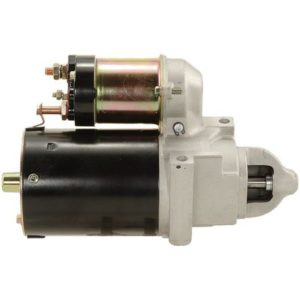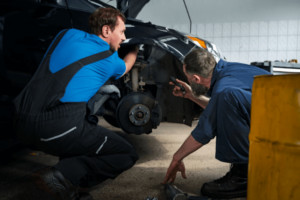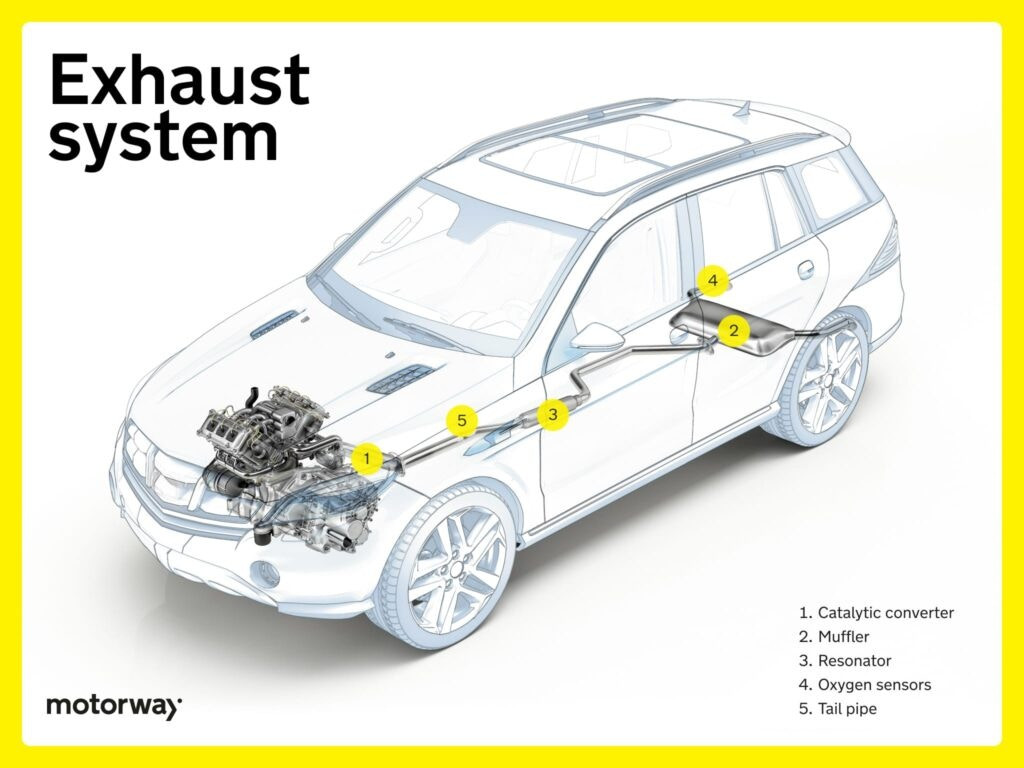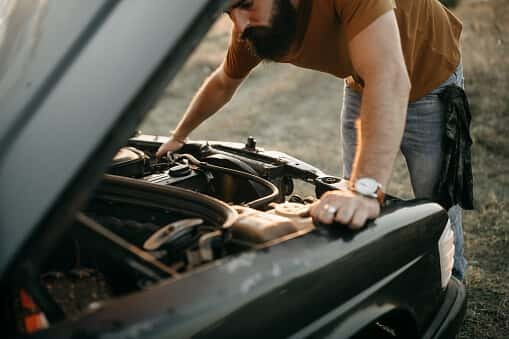How Much Is It To Fix Starter On A Car? A Comprehensive Guide

Is your car struggling to start? The culprit might be a faulty starter. At CARDIAGTECH.NET, we understand the frustration of a car that won’t turn over. Let’s explore “How Much Is It To Fix Starter On A Car,” providing you with cost breakdowns, diagnostic tips, and whether you should tackle this repair yourself or seek professional help. We’ll also discuss ways CARDIAGTECH.NET can assist you with the right tools for the job. Proper starter maintenance ensures reliable vehicle operation, preventing unexpected breakdowns and maximizing vehicle lifespan.
1. Understanding Starter Motor Function and Common Issues
The starter motor is a vital component of your vehicle’s starting system. It’s an electric motor that cranks the engine, initiating the combustion process. When you turn the key, the starter motor engages, turning the engine flywheel and starting the engine. Understanding how it works can help you diagnose potential problems. A malfunctioning starter can manifest in several ways:
- Slow Cranking: The engine turns over sluggishly, indicating a weak starter motor or a failing battery.
- Clicking Sound: A distinct clicking noise when you turn the key, but the engine doesn’t crank. This often points to a faulty solenoid or a dead spot in the starter motor.
- No Response: Absolutely no sound when you turn the key. This could be due to a completely dead starter motor, a blown fuse, or a problem with the ignition switch.
- Grinding Noise: A harsh grinding sound when you try to start the engine. This suggests worn-out gears within the starter motor or damage to the flywheel ring gear.
- Engine Starts Intermittently: The car starts sometimes but not others, indicating a loose connection or internal wear in the starter motor.
These symptoms can often be mistaken for other issues, so it’s important to correctly diagnose the problem.
2. Key Factors Influencing Starter Repair Costs
Several factors influence the cost of fixing a car starter. Understanding these elements will help you anticipate the overall expense and potentially save money.
- Vehicle Make and Model: Luxury or high-performance vehicles often have more expensive starter motors and may require specialized labor. Parts for common cars like Toyota or Honda are generally more affordable.
- Starter Location: Some starters are easily accessible, while others are buried deep within the engine compartment. Starters located in difficult-to-reach spots will increase labor costs.
- New vs. Remanufactured Starter: You can choose between a brand-new starter or a remanufactured one. Remanufactured starters are usually cheaper but may not last as long as new units.
- Labor Costs: Labor rates vary significantly depending on your location and the mechanic’s experience. Dealerships typically charge higher labor rates than independent repair shops.
- Additional Repairs: Sometimes, other components like the battery cables or the flywheel need to be addressed, adding to the overall cost.
- Diagnostic Fees: Expect to pay a diagnostic fee to determine if the starter is the actual problem.
- Warranty: Starters and labor often come with a warranty. A longer warranty will generally increase cost.
 Car starter motor
Car starter motor
3. Average Cost to Replace a Car Starter: A Detailed Breakdown
Let’s break down the typical costs associated with replacing a car starter. These are average estimates, and actual prices can vary based on the factors mentioned above.
Table 1: Average Starter Replacement Costs by Vehicle Type
| Vehicle Type | Part Cost (New) | Part Cost (Remanufactured) | Labor Cost | Total Cost |
|---|---|---|---|---|
| Compact Car | $100 – $250 | $75 – $150 | $100 – $200 | $200 – $450 |
| Sedan | $150 – $300 | $100 – $200 | $120 – $250 | $270 – $550 |
| Truck/SUV | $200 – $400 | $150 – $300 | $150 – $350 | $350 – $750 |
| Luxury/Performance Car | $300 – $600+ | $200 – $400+ | $200 – $500 | $500 – $1100+ |
Table 2: Detailed Cost Components
| Cost Component | Average Cost Range | Description |
|---|---|---|
| New Starter Motor | $80 – $600+ | The cost of a new starter motor from an auto parts store or dealership. |
| Remanufactured Starter | $75 – $400+ | A refurbished starter motor, often more affordable than new. |
| Labor | $100 – $500+ | The cost of a mechanic’s time to remove the old starter and install the new one. Rates vary by location and complexity of the job. |
| Diagnostic Fee | $50 – $150 | The cost to diagnose the starting issue. This may be waived if you proceed with the repair. |
| Taxes and Fees | Varies | State and local taxes on parts and labor. |
These tables will give you a clearer idea of what to expect when you need to fix or replace your car’s starter.
4. DIY vs. Professional Starter Replacement: Which is Right for You?
Deciding whether to replace the starter yourself or hire a professional depends on your mechanical skills, tools, and comfort level. Here’s a comparison to help you decide:
Table 3: DIY vs. Professional Starter Replacement
| Factor | DIY | Professional |
|---|---|---|
| Cost | Lower (parts only) | Higher (parts + labor) |
| Skill Level | Requires moderate mechanical skills, familiarity with basic tools, and the ability to follow instructions. | No mechanical skills required. |
| Time | Can take several hours, especially if you’re not experienced. | Typically completed in 1-3 hours. |
| Tools | Requires a socket set, wrenches, jack and jack stands, multimeter (optional), and possibly specialized tools depending on the vehicle. CARDIAGTECH.NET offers a wide range of tools for this job. | All tools provided. |
| Warranty | Parts warranty only (if purchased from a store). | Parts and labor warranty. |
| Risk | Potential for injury if not done properly. Risk of damaging other components. | Lower risk of damage or injury. |
| Convenience | Requires you to diagnose the problem, purchase the parts, and perform the repair yourself. | Convenient; the shop handles everything. |
If you are confident in your abilities and have the necessary tools, DIY can save you money. However, if you’re unsure or lack the tools, hiring a professional is the safer and more convenient option. CARDIAGTECH.NET can equip you with high-quality tools if you choose the DIY route, ensuring a successful repair.
5. Step-by-Step Guide to DIY Starter Replacement
If you decide to replace the starter yourself, follow these steps. Remember to consult your vehicle’s repair manual for specific instructions and safety precautions.
Steps:
- Gather Your Tools: You’ll need a socket set, wrenches, jack and jack stands, safety glasses, gloves, and a new or remanufactured starter. CARDIAGTECH.NET offers complete toolkits to make this easier.
- Disconnect the Battery: Disconnect the negative terminal of the battery to prevent electrical shocks.
- Locate the Starter: Consult your vehicle’s repair manual to find the starter’s location. It’s usually near the engine block.
- Raise the Vehicle: If necessary, use a jack and jack stands to safely lift the vehicle.
- Disconnect Wires: Disconnect the wires connected to the starter. Note their positions for reassembly.
- Remove Mounting Bolts: Remove the bolts holding the starter in place.
- Remove the Starter: Carefully remove the old starter.
- Install the New Starter: Install the new starter, aligning it with the mounting holes.
- Reinstall Bolts and Wires: Reinstall the mounting bolts and reconnect the wires.
- Lower the Vehicle: If you raised it, carefully lower the vehicle.
- Reconnect the Battery: Reconnect the negative terminal of the battery.
- Test the Starter: Start the car to ensure the new starter is working correctly.
Safety First: Always wear safety glasses and gloves, and use jack stands to support the vehicle.
6. Choosing the Right Starter Motor: New vs. Remanufactured
When replacing your starter, you have two main options: a new starter or a remanufactured one. Each has its pros and cons:
Table 4: New vs. Remanufactured Starter Motors
| Feature | New Starter Motor | Remanufactured Starter Motor |
|---|---|---|
| Cost | Higher | Lower |
| Reliability | Typically more reliable, as all components are new. | Can be reliable, but depends on the quality of the remanufacturing process. |
| Lifespan | Longer lifespan, as all parts are new and not subject to previous wear. | Potentially shorter lifespan than a new starter, as some components may have been previously used. |
| Warranty | Often comes with a longer warranty period. | Usually comes with a shorter warranty period compared to new units. |
| Environmental Impact | Higher environmental impact due to the production of new materials. | Lower environmental impact, as it reuses existing components and reduces waste. |
| Inspection | Typically undergoes rigorous quality control checks and testing. | Quality control can vary between manufacturers; check for reputable remanufacturers. |
| Best For | Those who prioritize reliability and longevity and are willing to pay more. | Those on a budget who still need a functioning starter and are willing to accept potentially shorter lifespan or reliability. |
| Availability | Generally readily available for a wide range of vehicle makes and models. | Availability can sometimes be limited depending on the vehicle make and model. |
7. Common Signs of a Failing Starter Relay and How to Test It
The starter relay is an electrical switch that sends power to the starter motor when you turn the key. A failing starter relay can prevent the starter from engaging. Here are some common signs of a failing starter relay:
- Clicking Sound: A rapid clicking sound from the relay when you try to start the car.
- No Starter Engagement: The engine doesn’t crank, and you hear nothing when you turn the key.
- Intermittent Starting: The car starts sometimes but not others.
How to Test the Starter Relay:
- Locate the Relay: Consult your vehicle’s repair manual to find the starter relay in the fuse box.
- Test with a Multimeter: Use a multimeter to check for continuity across the relay terminals when the ignition is turned on. If there’s no continuity, the relay is likely faulty.
- Swap with a Known Good Relay: Swap the starter relay with another relay of the same type in the fuse box (e.g., the horn relay). If the car starts, the original relay is bad.
- Professional Testing: If you’re unsure, have a mechanic test the relay.
8. Extending the Life of Your Car Starter: Preventive Maintenance Tips
Proper maintenance can extend the life of your car starter and prevent premature failure. Here are some tips:
- Maintain a Healthy Battery: A weak battery puts extra strain on the starter. Ensure your battery is properly charged and replace it when necessary.
- Check and Clean Battery Connections: Clean and tighten battery terminals to ensure good electrical contact.
- Avoid Short Trips: Short trips don’t allow the battery to fully recharge, which can strain the starter.
- Minimize Accessory Use While Starting: Avoid using headlights, radio, or other accessories while starting the engine.
- Regular Vehicle Checkups: Have your car regularly inspected by a mechanic to catch potential issues early.
- Address Starting Problems Promptly: Ignoring starting problems can lead to more severe damage to the starter and other components.
9. How to Find a Reputable Mechanic for Starter Replacement
If you decide to hire a professional mechanic, finding a reputable one is essential. Here’s how:
- Ask for Recommendations: Ask friends, family, and coworkers for recommendations.
- Check Online Reviews: Read online reviews on sites like Google, Yelp, and Better Business Bureau.
- Look for Certifications: Look for mechanics with ASE (Automotive Service Excellence) certifications.
- Get Multiple Quotes: Get quotes from several mechanics to compare prices.
- Ask About Warranty: Inquire about the warranty on parts and labor.
- Check Their Experience: Ask about the mechanic’s experience with starter replacements on your vehicle make and model.
- Visit the Shop: Visit the shop to assess its cleanliness and organization.
- Trust Your Gut: Choose a mechanic you feel comfortable with and trust.
10. The Importance of Proper Tools and Equipment for Starter Repair
Having the right tools and equipment is essential for a successful starter repair, whether you’re doing it yourself or hiring a professional. CARDIAGTECH.NET provides a wide range of high-quality tools to meet your needs.
Table 5: Essential Tools and Equipment for Starter Repair
| Tool/Equipment | Description | Why It’s Important |
|---|---|---|
| Socket Set and Wrenches | A comprehensive set of sockets and wrenches in various sizes. | Essential for removing and installing bolts and nuts on the starter. |
| Jack and Jack Stands | A hydraulic jack and sturdy jack stands for safely lifting and supporting the vehicle. | Provides safe access to the starter if it’s located underneath the vehicle. |
| Multimeter | A device for measuring voltage, current, and resistance in electrical circuits. | Used to diagnose electrical issues, such as a faulty starter relay or a weak battery. |
| Torque Wrench | A wrench that allows you to tighten bolts to a specific torque setting. | Ensures that bolts are tightened to the manufacturer’s specifications, preventing damage to the starter and engine. |
| Wire Brush | A brush for cleaning battery terminals and electrical connections. | Removes corrosion and ensures good electrical contact. |
| Battery Terminal Cleaner | A tool for cleaning battery terminals and posts. | Helps remove corrosion and maintain a strong electrical connection, which is critical for the starter’s performance. |
| Safety Glasses | Protective eyewear to shield your eyes from debris and sparks. | Essential for safety during the repair process. |
| Gloves | Protective gloves to protect your hands from grease, dirt, and potential injuries. | Provides a barrier against harmful substances and prevents cuts or abrasions. |
| Diagnostic Scanner | A device that can read and clear diagnostic trouble codes (DTCs) from the vehicle’s computer. CARDIAGTECH.NET offers advanced diagnostic scanners. | While not always necessary for starter replacement, a diagnostic scanner can help identify related issues or confirm that the starter is indeed the problem. |
Investing in quality tools from CARDIAGTECH.NET ensures that you have the right equipment to perform the repair safely and effectively.
11. Potential Hidden Costs to Consider During Starter Replacement
While the cost estimates provided earlier cover the basics, some hidden costs can arise during a starter replacement. Being aware of these potential expenses can help you budget more accurately.
Table 6: Potential Hidden Costs During Starter Replacement
| Hidden Cost | Description |
|---|---|
| Corroded Battery Cables | If the battery cables are corroded, they may need to be replaced to ensure proper electrical connection. |
| Damaged Flywheel Ring Gear | The flywheel ring gear is what the starter engages to turn the engine. If it’s damaged, it will need to be repaired or replaced, adding to the cost. |
| Broken Starter Mounting Bolts | Sometimes, the starter mounting bolts can break during removal, requiring specialized tools to extract them. |
| Additional Diagnostic Work | If the initial diagnosis was incorrect, further diagnostic work may be needed to pinpoint the actual problem. |
| Fluid Leaks | Disturbing the starter may reveal or exacerbate existing fluid leaks (e.g., oil or coolant), which will need to be addressed. |
| Unexpected Labor Complications | If the starter is particularly difficult to access or if other components need to be removed for access, the labor costs may increase beyond the initial estimate. |
| Software Updates | In some newer vehicles, replacing the starter may require a software update to ensure proper communication with the vehicle’s computer system. |
| Environmental Fees | Some shops may charge environmental fees for the disposal of used parts and fluids. |
| Towing Costs | If the car won’t start, you may need to pay for towing to get it to the repair shop. |
12. Starter Replacement and Your Car Insurance: What You Need to Know
Generally, starter replacement is considered routine maintenance and is not covered by car insurance. Car insurance typically covers damages resulting from accidents, theft, or natural disasters. However, there are some exceptions:
- Accident-Related Damage: If the starter failed due to an accident, your collision coverage might cover the repair.
- Comprehensive Coverage: If the starter was damaged by a covered event, such as a flood or vandalism, your comprehensive coverage may apply.
- Mechanical Breakdown Insurance: Some insurance companies offer mechanical breakdown insurance, which covers repairs to mechanical components like the starter.
Check your insurance policy for specific details and coverage limits.
13. Frequently Asked Questions (FAQs) About Starter Replacement
Here are some frequently asked questions about starter replacement:
Table 7: Frequently Asked Questions (FAQs) About Starter Replacement
| Question | Answer |
|---|---|
| What are the signs of a bad starter? | Common signs include slow cranking, clicking sounds, no response when turning the key, and grinding noises. |
| How long does it take to replace a starter? | Typically, it takes between 1 and 3 hours, depending on the vehicle and the mechanic’s experience. |
| Can I drive my car with a bad starter? | It’s not recommended. A bad starter can leave you stranded. |
| Is it cheaper to rebuild or replace a starter? | Rebuilding is generally cheaper, but replacement is often more reliable. |
| How much does a new starter cost? | The cost varies depending on the vehicle but typically ranges from $80 to $600+. |
| What tools do I need to replace a starter myself? | You’ll need a socket set, wrenches, jack and jack stands, safety glasses, and gloves. CARDIAGTECH.NET offers complete toolkits. |
| How can I find a reputable mechanic? | Ask for recommendations, check online reviews, look for ASE certifications, and get multiple quotes. |
| What is a starter relay, and how do I test it? | The starter relay is an electrical switch that sends power to the starter. You can test it with a multimeter or by swapping it with a known good relay. |
| Is starter replacement covered by car insurance? | Generally, no. Starter replacement is considered routine maintenance and is not covered by car insurance unless it’s related to an accident or covered by mechanical breakdown insurance. |
| How can I extend the life of my car starter? | Maintain a healthy battery, check and clean battery connections, avoid short trips, and minimize accessory use while starting. |
| What are some potential hidden costs during starter replacement? | Potential hidden costs include corroded battery cables, damaged flywheel ring gear, broken starter mounting bolts, and additional diagnostic work. |
| What are the benefits of using high-quality tools from CARDIAGTECH.NET? | High-quality tools ensure a safe and effective repair, prevent damage to the vehicle, and provide long-lasting performance. CARDIAGTECH.NET offers a wide range of tools and equipment to meet your needs. |
14. Actionable Steps to Take if Your Car Starter Fails
When your car starter fails, it’s essential to take prompt action to minimize inconvenience and potential damage. Here’s a step-by-step guide:
-
Assess the Situation: First, determine if the starter is indeed the problem. Consider the symptoms: slow cranking, clicking sound, or no response.
-
Check the Basics: Before assuming the worst, check the simple things first:
- Battery: Ensure the battery is charged and the connections are clean and tight. A weak battery can mimic starter problems.
- Fuses: Check the starter fuse in the fuse box. A blown fuse can easily be replaced.
-
Attempt a Jump Start: If the battery seems weak, try jump-starting the car. If it starts with a jump, the battery is likely the culprit.
-
Listen Carefully: Pay attention to any noises when you turn the key:
- Clicking: A single click may indicate a faulty solenoid.
- Rapid Clicking: Rapid clicking often points to a dead battery or a bad starter relay.
- Grinding: Grinding suggests a problem with the starter motor or the flywheel ring gear.
-
Decide on DIY or Professional Repair: Based on your mechanical skills, tools, and comfort level, decide whether to attempt the repair yourself or hire a professional mechanic.
-
Gather Tools and Equipment (DIY): If you choose the DIY route, gather the necessary tools and equipment. CARDIAGTECH.NET offers a comprehensive range of high-quality tools to ensure a successful repair.
-
Consult a Repair Manual (DIY): Refer to your vehicle’s repair manual for specific instructions and safety precautions.
-
Follow the Repair Steps (DIY): Carefully follow the repair steps outlined earlier in this guide.
-
Contact a Reputable Mechanic (Professional Repair): If you opt for professional repair, contact a reputable mechanic. Ask for recommendations, check online reviews, and get multiple quotes.
-
Get a Detailed Estimate (Professional Repair): Obtain a detailed estimate from the mechanic, including the cost of parts, labor, and any potential hidden costs.
-
Authorize the Repair (Professional Repair): Once you’re comfortable with the estimate, authorize the mechanic to proceed with the repair.
-
Follow Up: After the repair, ensure that the car starts reliably and that any warranty is clearly documented.
15. How CARDIAGTECH.NET Can Help You with Starter Repair
At CARDIAGTECH.NET, we understand the challenges of car repair. We offer a wide range of high-quality tools and equipment to assist you with starter repair, whether you’re a DIY enthusiast or a professional mechanic.
Here’s how we can help:
- Comprehensive Toolkits: We offer complete toolkits specifically designed for automotive repair, including everything you need for starter replacement.
- High-Quality Tools: Our tools are made from durable materials and are designed to provide long-lasting performance.
- Diagnostic Scanners: We offer advanced diagnostic scanners to help you pinpoint the problem and ensure an accurate repair.
- Expert Advice: Our team of experts can provide advice and guidance on starter repair and tool selection.
- Competitive Prices: We offer competitive prices on all our products.
- Fast Shipping: We offer fast shipping to get you the tools you need quickly.
By choosing CARDIAGTECH.NET, you can be confident that you’re getting the best tools and support for your starter repair project.
16. Call to Action: Get Expert Assistance from CARDIAGTECH.NET
Facing starter problems and unsure where to start? CARDIAGTECH.NET is here to help! Don’t let a faulty starter leave you stranded. Contact us today for expert advice, tool recommendations, and solutions tailored to your specific needs.
- Address: 276 Reock St, City of Orange, NJ 07050, United States
- WhatsApp: +1 (641) 206-8880
- Website: CARDIAGTECH.NET
Let CARDIAGTECH.NET empower you to take control of your car’s starter repair, saving you time, money, and frustration. Whether you’re a seasoned mechanic or a first-time DIYer, we have the tools and expertise to get you back on the road with confidence. Contact us now and experience the CARDIAGTECH.NET difference!






